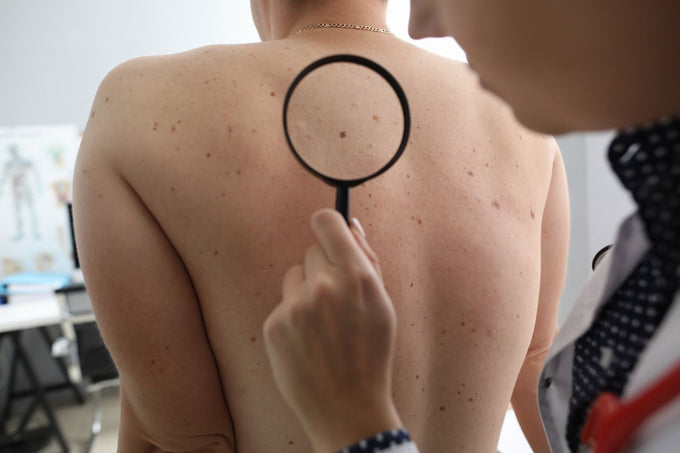What To Expect During A Skin Exam with Dr. Beth Goldstein

Medical Advice Disclaimer: This content is not intended to be a substitute for professional medical advice, diagnosis, or treatment. Always seek the advice of your physician or qualified healthcare provider. Never disregard medical advice or delay care because of something you have read in this content.
Skin Exam 101 with Dermatologist Dr. Beth Goldstein
Dr. Beth Goldstein, a dermatologist and the founder of Modern Ritual speaks to UV Skinz about what happens during a skin check, what you need to know, and how to best prepare for one.
When Do You Need A Skin Check?
Individuals without skin cancer risk factors who have an established primary care provider (PCP) may get a skin check done by their PCP, rather than a dermatologist.
Dr. Goldstein’s list of primary risk factors includes the following:
- Large amount of moles.
- Several moles greater than the size of a pencil eraser.
- Family or personal history of skin cancer.
- Tanning bed use.
- Suppressed immune system (from medications or chronic disease).
- New or changing moles.
- Non-healing sores or spots on the skin after 4 weeks.
It’s not recommended to do your own skin checks or have them done by non-medical personnel.
Healthcare providers are able to check the full body (including the groin, back, and scalp) thoroughly. They are also able to recognize the difference between a benign mole, a suspicious mole, and a potentially cancerous mole.
What Happens During a Skin Check?
Your doctor or dermatologist will perform a thorough check of your skin, looking for any new or changing moles or sores, or spots. You will be asked to put on a dressing gown before and asked some questions about your medical history and lifestyle.
At this time, you can also alert your doctor/dermatologist to any areas of concern.
What Do Providers Wish Patients Knew About Skin Checks?
Dr. Goldstein had several tips for patients getting a skin check:
- Avoid wearing makeup. This can cover up spots that need to be checked.
- If you have a concerning spot on your skin, circle it the day before or the day of the exam. This will help you locate the mole and monitor changes in its size
- Be aware that you will be checked from head to toe. This will mean you will be undressed in a medical gown.
- Avoid nail polish. This can obstruct potential suspicious spots near the nail beds.
- Clear your schedule. Ideally, a suspicious spot will be biopsied or possibly removed that day, which may take additional time.
- Gather your medical documents prior to the appointment. Bring a list of your medications, allergies, and family history of skin cancer. If you’ve had previous atypical moles, bring documentation about those reports and biopsies.
- Bring any skin treatments. If you’re using medications for your skin, bring those to your appointment so your dermatologist can check and document them.
What If Something Suspicious Is Found During a Skin Exam?
If something suspicious is found during a skin exam, a dermatologist will take a close-up photo of it with a device called a dermatoscope.
If a biopsy is necessary, it will likely be done that day or during a visit shortly after. For a biopsy, a numbing medicine will be injected with a small needle so you won’t feel the procedure.
There are instances where just a small piece of the lesion is needed for testing, but other times it will need to be fully removed.
There are instances where you may need a stitch or a few stitches. The stitches will usually be removed after about a week.
How to Prepare For Your Next Skin Exam
Ask your medical provider what an appropriate skin check regimen is for you before signing up for one.
Many providers recommend that individuals get a baseline check in their early 20s, and continue to get checked annually, depending on their risk factors. However, this may depend on your personal and family history.
For clothing that prevents increased sun exposure and reduces your chance of skin cancer, check out our UPF swimwear and clothing lines for the entire family.






